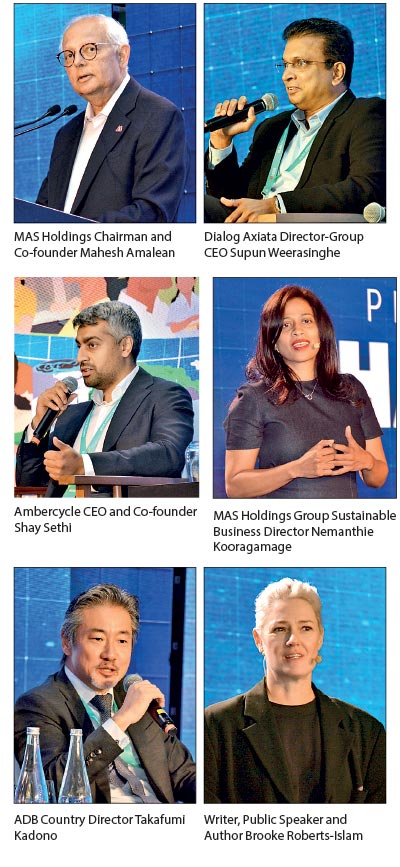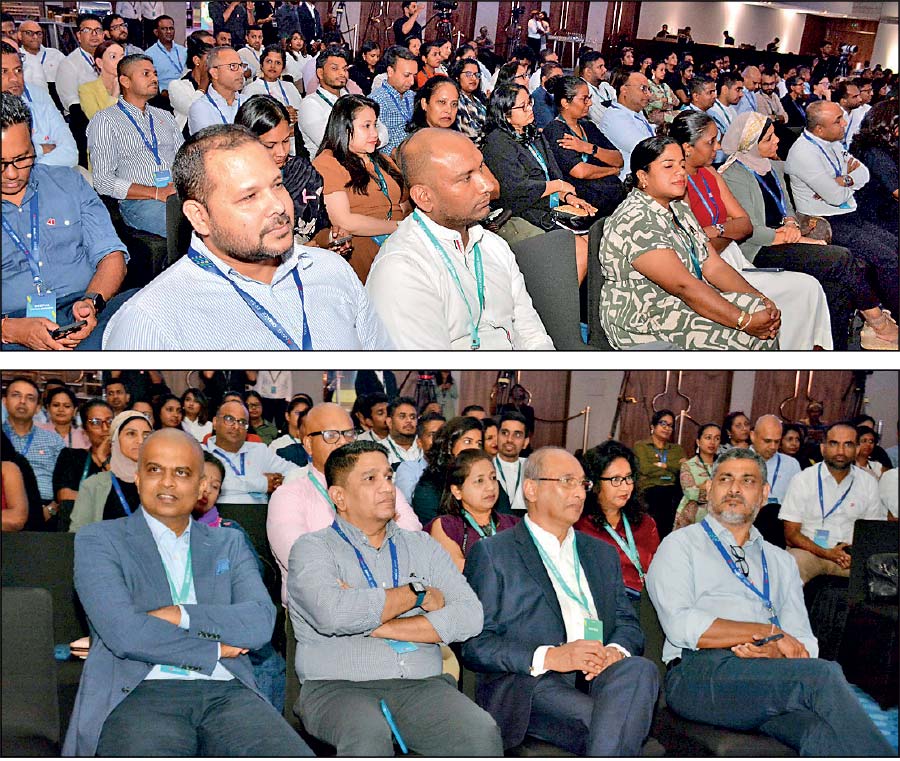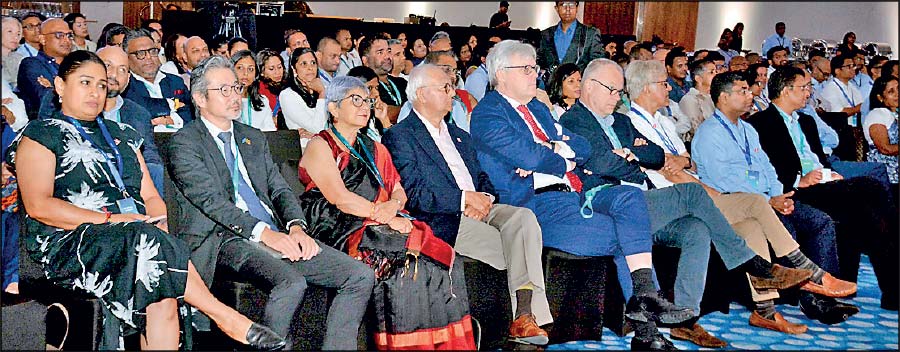Friday Feb 20, 2026
Friday Feb 20, 2026
Thursday, 16 October 2025 05:03 - - {{hitsCtrl.values.hits}}

By Amira Cader
 MAS Holdings unveiled its bold and forward-thinking sustainability strategy under the banner “Plan for Change 2030: Inspiring change beyond the good” at a high-impact forum attended by global sustainability leaders, industry pioneers and community stakeholders at the Cinnamon Life Colombo yesterday.
MAS Holdings unveiled its bold and forward-thinking sustainability strategy under the banner “Plan for Change 2030: Inspiring change beyond the good” at a high-impact forum attended by global sustainability leaders, industry pioneers and community stakeholders at the Cinnamon Life Colombo yesterday.
The forum addressed pressing issues around climate change, textile circularity, social equity and supply chain resilience, while emphasising the urgent need for ethical transformation in the apparel sector.
Delivering a powerful keynote, Brooke Roberts-Islam, noted sustainability advocate and industry journalist, underlined the critical intersection of climate change and ethical practices in fashion: “The apparel industry is at a tipping point. If we do not embed ethical values at the core of innovation, we risk perpetuating a cycle of harm — to the planet and to people. Global warming isn’t just an environmental crisis, it’s a humanitarian one. MAS Holdings’ Plan for Change signals a necessary shift from ambition to accountable action.”
She praised MAS’s approach, which integrates social resilience with environmental stewardship, calling it a blueprint that other global fashion companies must urgently adopt.
As Roberts-powerfully stated during the keynote: “This plan isn’t about doing less harm — it’s about doing more good. We must move from sustainability as a marketing term to sustainability as a moral obligation, with people and the planet at the core.”
The panel discussion brought together high-level voices who reflected on actionable strategies amidst global volatility.
MAS Holdings Director – Group Sustainable Business Nemanthie Kooragamage said: “This isn’t just about reducing impact — it’s about regenerating. Our supply chains, our people, our planet — they all need to be empowered, not just protected. Plan for Change is our contract with the future.”
Ambercycle Co-founder and CEO Shay Sethi added: “Circularity must move from concept to infrastructure. Technology exists. What we need now is radical collaboration across regions and regulators.”
Asian Development Bank Country Director Takafumi Kadono focused on policy and financing: “Scaling sustainable apparel requires both private and public investment. MAS shows what’s possible when business aligns with long-term climate goals.”
He further added, “Sri Lanka’s industrial growth over the past two decades has been only around 20%, while Vietnam has surged by over 300%. Despite Sri Lanka’s rich geography, strategic location and natural resources, we have clearly missed the bus. But the time to catch the next one is now—and sustainability must drive that journey.”
Dialog Axiata PLC CEO Supun Weerasinghe shared insights on digital innovation: “The integration of data and technology can help transform sustainability from an ambition into an operational system of accountability, despite the challenges of COVID-19 and the economic crisis, Sri Lanka is recovering at a good pace. The momentum is real—we’re moving in a positive direction.”
MAS Holdings envisions a future where every garment created is not only high-performing but also ethically made and environmentally responsible. This focuses on reinventing the design and production of apparel to serve the planet and people.
Product: Creating future-fit apparel
MAS is transforming how garments are made, focusing on innovation and sustainability at every stage.
1. Textile-to-Textile Circularity to recycle post-consumer waste into new garments.
2. Development of Materials of the Future, including bio-based and regenerative alternatives.
3. Expansion of natural and responsibly sourced fibres like organic cotton and hemp.
Planet: Regenerating our world
Going beyond sustainability, MAS is investing in restorative environmental practices.
1. Transition to renewable energy and low-carbon logistics.
2. Circular waste management to minimise landfill impact.
3. Adoption of responsible chemical use in textile processing.
4. Water stewardship and water-positive goals in high-stress regions.
5. Launch of ecosystem regeneration projects including reforestation and biodiversity restoration.
Lives: Building resilient lives
MAS recognises that environmental progress must go hand-in-hand with social responsibility.
The Plan for Change 2030 is more than an internal framework—it’s a call to action for the global apparel industry to prioritise ethics, equity and environmental restoration.
MAS Holdings Co-Founder and Chairman Mahesh Amalean underlined the company’s broader mission: “We’re not just reducing our footprint. We’re creating a future where our products, people and planet thrive in balance.”
With clear targets and transparent
strategies, MAS Holdings is positioning itself as a leader in sustainable fashion, driving change not just in what we wear—but we live, produce and protect our shared planet.
Investing in local community infrastructure, education, disaster preparedness and adaptation strategies to help vulnerable populations cope with the impacts of climate change. MAS collaborates with NGOs and local governments to drive meaningful and measurable change.
Each of these is interconnected, forming a comprehensive strategy that acknowledges the complexity of today’s global sustainability challenges. MAS Holdings’ Plan for Change 2030 represents not only an internal transformation but also a call to the entire apparel industry to reimagine its role in building a sustainable just and regenerative future.
-Pix by Upul Abayasekara

